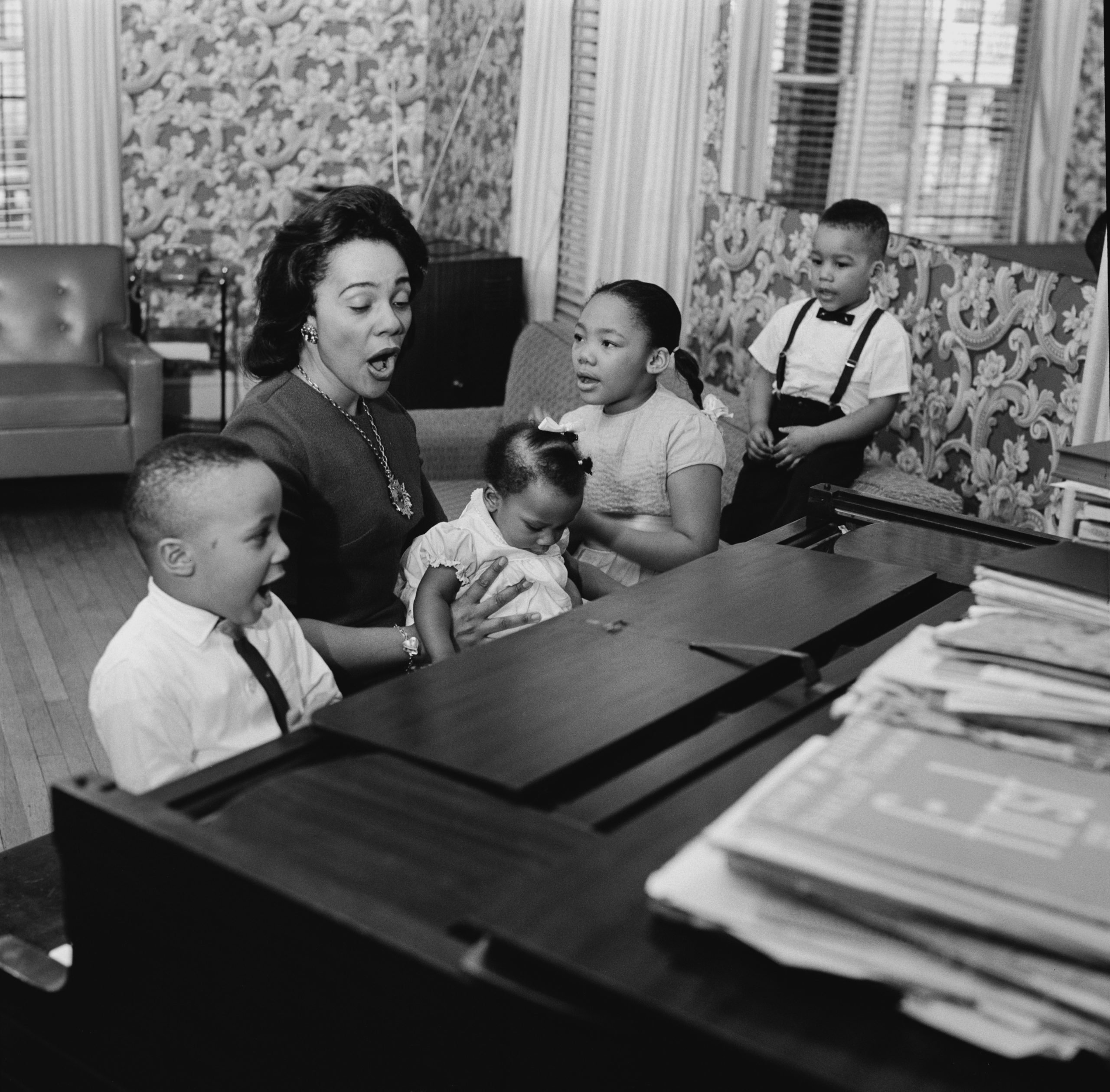Coping with Ovarian Cancer and the Risk of Recurrence
- Civil Rights activist Coretta Scott King, wife of Dr. Martin Luther King, Jr., was heavily influential in the Civil Rights movement. Her advocacy extended well beyond her husband’s assassination in 1968.
- Later in life, Mrs. King suffered health complications, including a heart attack, a stroke, and stage 3 ovarian cancer. She died in 2006 amid complications from the cancer.
- Ovarian cancer is often harder to catch in its early stages because of its subtle symptoms, such as bloating, weight gain, and abdominal pain that can mimic regular menstrual cycle fluctuations. After ovarian cancer patients complete initial treatment, maintenance therapy may be recommended to try and delay possible recurrence.
- Maintenance therapy for ovarian cancer can involve taking an oral pill called a PARP inhibitor every day after chemotherapy and can keep cancer in remission longer. PARP inhibitors prevent cancer cells from repairing their DNA.
- Elahere (molecular name mirvetuximab) is an FDA-approved targeted therapy providing much-needed hope for patients with platinum-resistant ovarian cancer (Your cancer returns within six months of treatment with platinum-based chemotherapies, like carboplatin and cisplatin.) This drug treatment is for women who test positive for a molecular factor called folate-receptor alpha (FRα).
- Ovarian cancer recurrence happens in “almost 25 percent of cases with early-stage diseases and in more than 80 percent with more advanced stages,” according to research published in Gland Surgery medical journal.
- Genetic testing helps doctors determine the most effective maintenance therapy.
The wife of Civil Rights icon Dr. Martin Luther King, Jr., Coretta, was just as influential to the broader movement advocating for civil rights as her famous husband. Many years after Dr. King’s assassination in 1968, Mrs. King continued her advocacy work to fulfill “the dream.”
However, during her later years, a series of health complications befell Mrs. King, including ovarian cancer. This type of cancer makes for a tough and emotional health challenge for women and their families largely because of its tendency to come back after initial treatment. Luckily, some advancements in treatment are available to improve the quality of life for patients battling the disease.
Read More
“She had a stroke, and she was recovering. She was walking with a cane, more erectly. But she was continuing to have clotting, which led to tests. She shed a few tears and said, ‘Okay, we’re going to face this,” Yolanda King continued.
According to the New York Times, Mrs. King was partly paralyzed from her stroke. Her cancer had spread to her intestines. She attempted to get treatment from a Mexican hospital known for treatments that ran contrary to the standard of care. Coretta King eventually died from complications from her cancer on January 30, 2006.
Coretta’s son, Martin Luther King III, honored his mother after her passing, noting that she “always stood with dignity and elegance” and “had a fierce love in her heart.
Although Dr. King’s activism is well-documented, Coretta was equally as influential. She was known at the height of the movement as the “first lady of the civil rights movement.” She witnessed racist terrorism while growing up in the South when her family’s home burned down, along with her father’s businesses, which helped fuel her interest in civil rights activism.

In the wake of Dr. King’s assassination in 1968, Coretta continued to dedicate her life to his cause with their four children. She started the Martin Luther King Jr. Center for Nonviolent Social Change in Atlanta and played a significant role in making MLK’s birthday a national holiday.
Helping Patients Understand Treatment Options for Ovarian Cancer
Battling Ovarian Cancer
Ovarian cancer has been called the “cancer that whispers” because women often don’t experience symptoms until their cancer has already reached its late stages. The symptoms that do appear at first are hard to identify as cancer.
“Ovarian cancer does not have any specific symptoms,” Dr. Beth Karlan, a gynecologic oncologist at UCLA Medical Center, told SurvivorNet.
Many ovarian cancers begin in the fallopian tubes. A few cancerous cells first grow on the fallopian tubes. Then, as the fallopian tubes brush over the ovary, these cells stick to the ovaries and eventually form a tumor.
“The symptoms include things like feeling full earlier than you usually would when your appetite is strong and feeling bloated. Some changes in your bowel habits. Some pain in the pelvis. These are symptoms women may have every month. These are not very specific. But we’ve found this constellation of symptoms from multiple studies,” Dr. Karlan added.
The symptoms of ovarian cancer may include the following, according to SurvivorNet experts.
- A feeling of bloating or fullness
- Pain in the pelvis or abdomen
- Nausea
- Vomiting
- Changes in bowel habits
How Ovarian Cancer Is Treated
The standard of care for ovarian cancer patients is chemotherapy, which helps many patients reach remission.
Ovarian cancer recurrence happens in “almost 25 percent of cases with early-stage diseases and in more than 80 percent with more advanced stages,” according to research published in Gland Surgery medical journal. With recurrence a strong possibility for this disease, especially in the later stages of ovarian cancer, certain drug treatments to deal with it are giving many women hope.
RELATED: Dealing with recurrence.
WATCH: Treating ovarian cancer.
Ovarian cancer is sub-categorized into two groups.
Platinum-Sensitive Ovarian Cancer: Your cancer does not return for more than six months after treatment with platinum-based chemotherapies, like carboplatin and cisplatin.
Platinum-Resistant Ovarian Cancer: Your cancer returns within six months of treatment with platinum-based chemotherapies, like carboplatin and cisplatin.
“The mechanism that causes platinum resistance will cause someone to be resistant to other chemotherapies, as well. That’s why we’re looking for what we call targeted therapies – precision medicine,” Dr. Noelle Cloven from Texas Oncology-Fort Worth Cancer Center explained.
RELATED: Recurrent Ovarian Cancer Treatment Is Your Disease “Platinum-Sensitive”?
Targeted therapies or precision medicine specifically target the proteins controlling cancer cells’ growth, division, and spread.
Maintenance Therapy for Ovarian Cancer
Maintenance therapy is continued treatment after the patient finishes their initial treatment. After an ovarian cancer patient completes a round of treatments — such as surgery and chemotherapy — her doctor may recommend some form of maintenance therapy to try and delay possible recurrence. Maintenance therapy can involve taking an oral pill called a PARP inhibitor every day after chemotherapy and can keep cancer in remission longer.
Genetic testing helps doctors determine the best maintenance therapy.
“The biggest question is: How do you choose between bevacizumab (brand name, Avastin) or a PARP inhibitor for maintenance therapy?” Dr. Alpa Nick, a gynecological oncologist with Tennessee Oncology in Nashville, tells SurvivorNet.
The drugs have very different ways of combatting cancer cells. PARP inhibitors prevent cancer cells from repairing their DNA, while Avastin blocks the formation of new blood vessels, starving tumors of nutrients.
The Food and Drug Administration approved bevacizumab (Avastin) to be used in conjunction with olaparib (brand name LYNPARZA) in HRD (Homologous Recombination Deficiency) positive women who show a response to platinum-based chemotherapy. During clinical trials, the drug combination increased progression-free survival from an average of 17 months to 37 months.
“A patient really has to make a decision upfront, or near the beginning of their treatment, that they want bevacizumab maintenance treatment because they’ll have it with their primary chemotherapy,” Dr. Nick explains.
The drug is administered intravenously and can be given in combination with other chemotherapy drugs. Avastin affects the growth of blood vessels, starving tumors of the blood they need as nourishment.
The American Society of Clinical Oncology (ASCO) guidelines recommend PARP inhibitors be offered to women, with or without genetic mutations, who are newly diagnosed with stage III or IV ovarian cancer and have improved with chemotherapy.
Surgery offers another important decision point. “When patients have their surgery, we can test their tumor to decide if their tumor has a homologous recombination deficiency,” known as HRD. If it does, that also suggests they would benefit from PARP inhibitor maintenance therapy,” says Dr. Nick.
Elahere (molecular name mirvetuximab) is an FDA-approved targeted therapy providing much-needed hope for patients with platinum-resistant ovarian cancer. This drug treatment is for women who test positive for a molecular factor called folate-receptor alpha (FRα). While many ovarian cancers test positive for the folate receptor, to be eligible for Elahere, you must have very high levels (>75%) of the folate receptor-alpha (FRα).
It is an antibody-drug conjugate. This kind of new anti-cancer drugs, known as “biological missiles,” is leading a new era of targeted cancer therapy.
The antibody part of the drug conjugates binds to the folate receptor on the tumor cells, and then that gets taken up into the tumor cell. The drug that it conjugates with kills the tumor cells by affecting the tumor cell’s ability to divide.
Questions for Your Doctor
If you have been diagnosed with ovarian cancer and need guidance to further educate yourself on the disease and treatment, consider these questions for your doctor.
- What type of ovarian cancer do I have?
- What stage is my cancer in?
- Do you recommend I get genetic testing for any gene mutations, such as the BRCA gene mutation?
- What initial treatment options do you recommend?
- What are the possible side effects of the recommended treatment, and how can they be coped with?
- Will insurance help cover my recommended treatment?
Learn more about SurvivorNet's rigorous medical review process.

